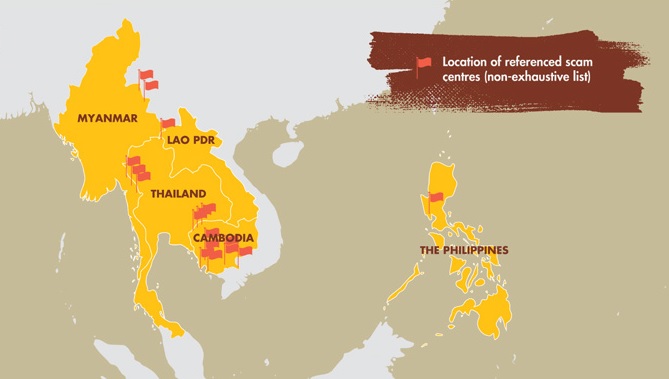Hundreds of thousands of enslaved online workers in Myanmar, Cambodia, and Laos
The Office of the United Nations High Commissioner for Human Rights in Bangkok releases its first comprehensive report on people forced to work for online scams. Highly qualified workers are among the victims are trafficked from places as far as Kenya, Brazil, and Turkey. War-torn regions and special economic zones are ideal places for these activities.
Bangkok (AsiaNews) – About 120,000 people in Myanmar and 100,000 in Cambodia might be involved in online scams under duress, this according to the first report by the Office of the United Nations High Commissioner for Human Rights (OHCHR) on the matter. AsiaNews too has covered the issue.
The UN agency notes that hundreds of irregular migrants lured by job offers work crammed into offices full of computers, carrying out online scams on social media with unsuspecting netizens. Often these men and women are victims of human trafficking, held against their will in such worksites, unable to go out.
This activity has flourished since the COVID-19 pandemic broke out around the world. Back in 2021, it was estimated that revenue from scamming globally amounted to US$ 7.8 billion worth of stolen cryptocurrency. Since then this figure has likely grown.
Collating complaints and local studies, the OHCHR report offers an overall map of the phenomenon, which not surprisingly found a haven in the so-called Golden Triangle, an area between Thailand, Laos and Myanmar sadly known for drug trafficking.
Both the pandemic and Myanmar’s post-coup chaos have created the ideal conditions for online scams to boom. Against the backdrop of a civil war, crime syndicates have flourished undisturbed, mixing trafficking in arms, drugs, and people.
Special Economic Zones (SEZs) too have become places of choice for such activities, the UN body states. In Cambodia, as of July 2023, online scam centres are or were reportedly operating in Phnom Penh, Kandal, Pursat, Koh Kong, Bavet, Preah Sihanouk, Oddar Meanchey, Svay Rieng, including in the Dara Sakor SEZ, and the Henge Thmorda SEZ.
In Myanmar, centres are said to exist in Shwe Kokko, in Myawaddy on the Thai border, including KK Zone and other compounds along the Moei River, Kokang Self-Administered Zone in Shan State, and the Wa-administered city of Mong La on the Chinese border.
In Laos the industry is said to be centred around the Golden Triangle Special Economic Zone (SEZ) in the northwest of the country.
In the Philippines, scam centres are reportedly operating by some Philippine Offshore Gaming Operators (POGOs), Philippines-based online gaming companies, and in SEZs such as the Clark Free Port Zone. More than 30 licensed POGOs exist, but many more operate illegally.
Documented trafficking cases in Southeast Asia usually involve people who have had limited access to education and are employed in low-wage jobs.
But in online gaming scams, the profile of trafficked people is very different. Most of the victims are well educated, computer literate, and multilingual, sometimes with a professional background with college or even postgraduate degrees.
The victims come from member states of the Association of Southeast Asian Nations (ASEAN), like Indonesia, Laos, Malaysia, Myanmar, the Philippines, Singapore, Thailand, and Vietnam; China (including Hong Kong); Taiwan; South Asia (Bangladesh, India, Nepal, Pakistan), East Africa (Ethiopia, Kenya, Tanzania), as well as Egypt, Turkey, and Brazil.
Most victims are adult men, but women have also been targeted – the report also notes that some teenagers have been caught up in this traffic as well.
For the report, an appropriate response should "not merely [involve] addressing organised crime or enforcing border controls.”
Instead, “All affected states need to summon the political will to strengthen human rights and improve governance and the rule of law, including through serious and sustained efforts to tackle corruption," UN High Commissioner for Human Rights Volker Türk said.
The report goes on to call for an approach that breaks “the cycle of impunity” and ensures “protection and justice for the people who have been trafficked and abused within this complex phenomenon.”
19/10/2023 14:30
08/07/2024 16:40







.png)










